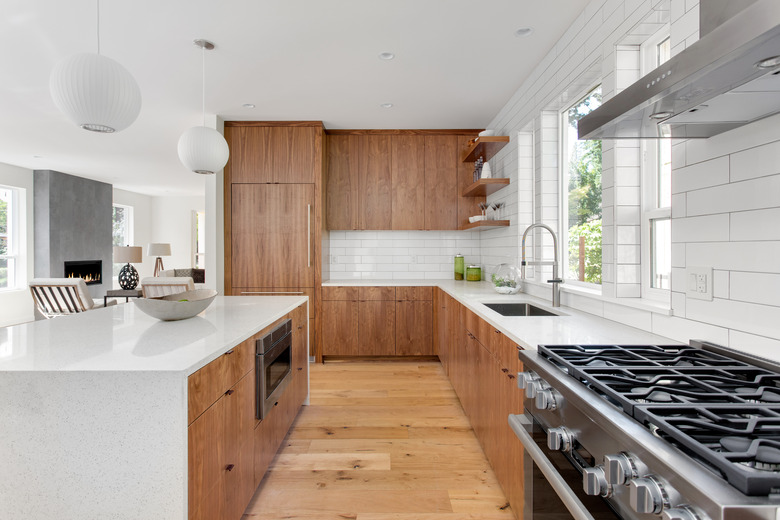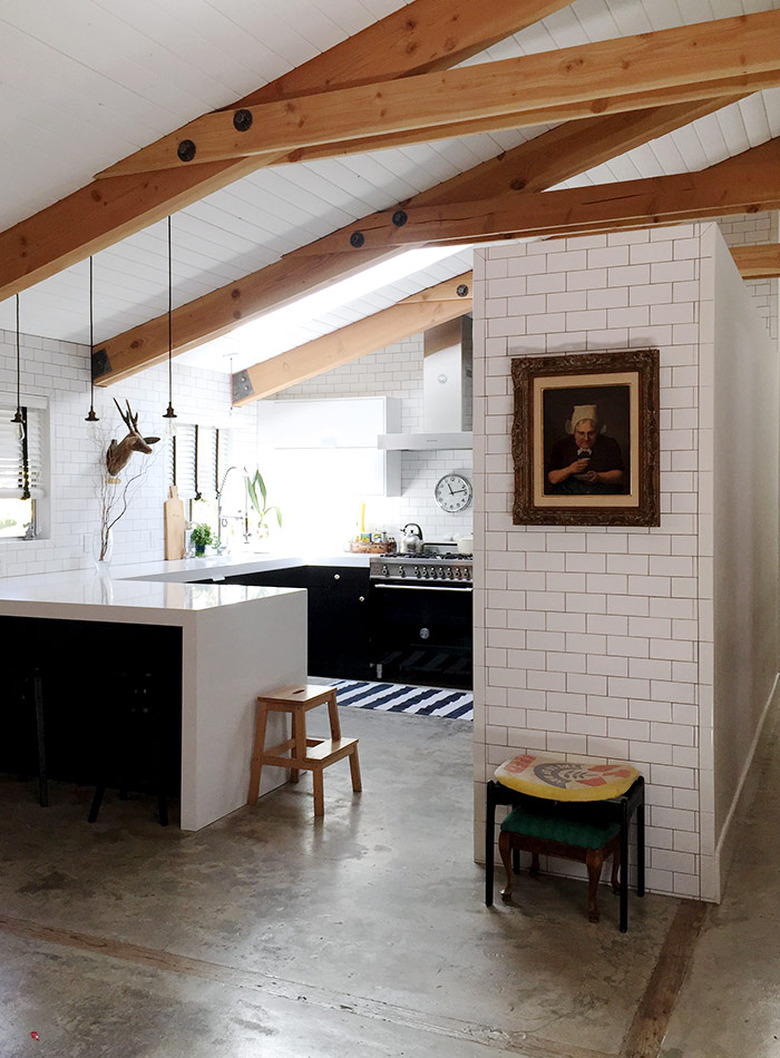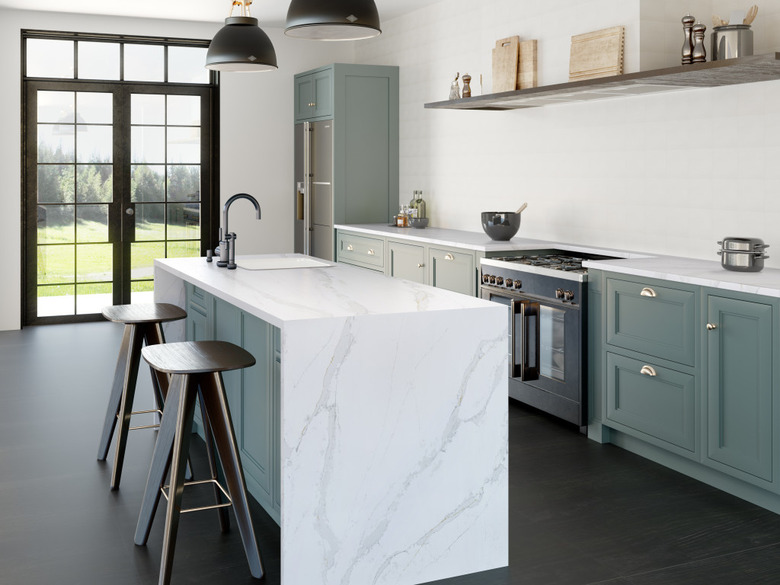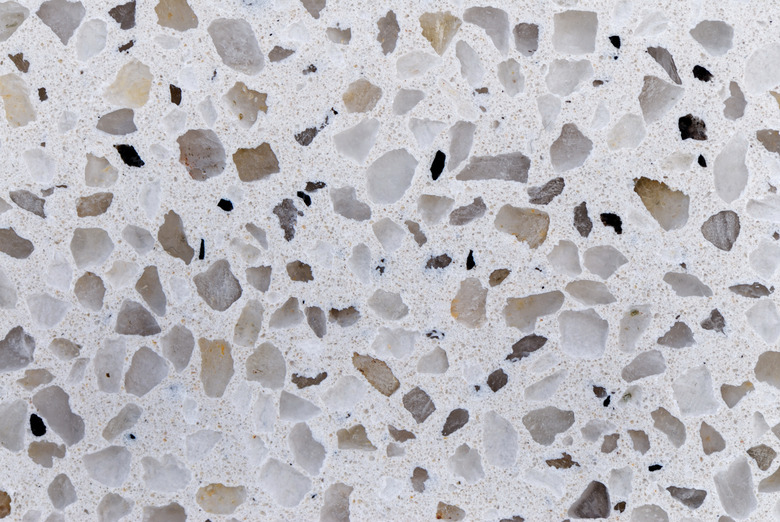Engineered Quartz Countertops: What You Need To Know
When designing a kitchen, there are many decisions every homeowner needs to make, from paint color to open shelving options; backsplash ideas to countertop materials. The countertop question, in particular, is one that is never taken lightly due to the fact that it is a main focal point of the kitchen — and the choices are numerous, including marble, quartz, laminate, stainless steel, and concrete.
As of late, quartz has been a go-to material for designers and homeowners who want to achieve a timeless look that functions just as well as natural stone (if not better). Engineered quartz is a man-made material developed by scientists. By using modern technology in combination with natural quartz they are able to create an even harder-than-rock surface, which can be manufactured in infinite colorways and textures. Natural quartz, or quartzite, is already a durable material, and engineered quartz is even more so; it's hard, dense, nonporous, nonabrasive, and nonreactive to acids, making it a perfect material for countertops, backsplashes, walls, and even floors. We've culled all the pros and cons around engineered quartz countertops — here's what you need to know.
First, let's break this mini geology lesson down even further: quartzite is a type of metamorphic rock that's created when sandstone confronts extreme heat and pressure caused by tectonic plate compression within the crust of the earth.
Quartz, on the other hand, is the name of the engineered version. It's fabricated from natural silicon dioxide and other synthetic materials, along with about 93 to 97 percent crushed quartzite that is blended with resin and pigment and then formed into slabs. You might recognize such popular brands as Maestro, Cambria, Caesarstone, and Silestone that widely produce engineered quartz.
Pros
Pros
1. The durability of engineered quartz is pretty much unmatched. Because engineered quartz is blended with synthetic resins that are insoluble in water, your countertops are less likely to chip or crack, unlike even the hardest natural stone.
2. Includes long warranties, so you're covered in case of any accidents or defects.
3. It's nonporous and resistant to bacteria growth. Not only is an engineered quartz worktop insusceptible to bacteria and germs, it is also unlikely to get stained and therefore will not require any type of sealing, ever.
4. This also means that engineered quartz is maintenance-free since its durable, nonporous surface is stain, scratch, and acid-abrasion-resistant, which allows it to stay in its original condition. Clean up is easily handled with soap and water, and again, no sealing.
5. If you're one who likes a uniform pattern, go with engineered quartz. The color and texture of engineered quartz remain consistent thanks to the control manufacturers have when creating the product. No such uniformity in color and patterns can be controlled in a slab of natural stone and varies from one side to the other.
6. The color palette available with engineered quartz is vast, and goes well beyond that of any naturally occurring spectrum. The range of colors can include bright greens, blues, and yellows, even rich reds or some combination. If you're into the look of natural stone minus the upkeep, contemporary brands have created versions that mimic high-end marble, like Calacatta gold, and just about any natural stone, plus solid and recycled glass patterns.
7. The versatility of engineered quartz also allows for just about any edging option you like. Unlike marble or granite, when poured, it can be used on larger vertical surfaces without the undesirable visible seams that are inevitable with natural stone.
Cons
Cons
1. Because engineered quartz did not come straight from the earth's layers like its quartzite relative, it therefore lacks the same variation in pattern and veining.
2. Engineered quartz can also come in slabs, depending on the manufacturer, so seams are sometimes visible similar to natural stone.
3. Engineered quartz is not as heat-resistant as stone, so using a trivet under hot items is an absolute must — though temperatures lower than 300 degrees Fahrenheit will not affect the material. On top of not being as heat-resistant as granite, engineered quartz is also prone to chip or crack if it experiences heavy impact near a protruding edge.
4. Man-made quartz is sensitive to certain chemicals common in household cleaners, so steer clear of highly acidic or alkaline-based heavy duty chemical cleaners or bleach.
5. There are certain limitations for where you can install engineered quartz, as it's not recommended for outdoor use because the resins used are not UV stable and warranties do not apply to outdoor applications. Anywhere near fireplaces is also a no-no and you should not use it as flooring over any radiant heat because long-term exposure to heat could damage the surface.
6. Since engineered quartz is even denser and heavier than real stone, certain installation considerations need to be given so that the proper structural support is provided by flooring and cabinetry.
7. Since fitting and installing engineered quartz countertops is a skilled procedure and requires special tools and equipment, most quartz countertops need to be installed by a professional. In areas where the cost of living is high, the installation costs are likely to also be comparatively higher.
Other Considerations
Other Considerations
1. Quartz countertops are an international product and manufactured in countries all around the world, so shipping cost can be a factor.
2. Costs will vary from region to region within the U.S. as well. Again, consider shipping costs and if you're outside of a major metropolitan area, the ability to compare brands could be limited.
3. The cost per square foot of installed quartz countertops also varies depending on the grade of the material and by the going rate for installation (i.e. labor cost) in a particular region. Areas with a high cost of living like San Francisco or New York City will warrant the highest costs per square foot (anywhere from $60 to $125 per square foot).
4. Keep in mind that most of the estimates for engineered quartz countertops will likely assume a straight edge known as an eased edge. But if you prefer a rounded edge, or bullnose, it will cost a bit more and an ogee, or "S"-shape edge, will run even higher.




